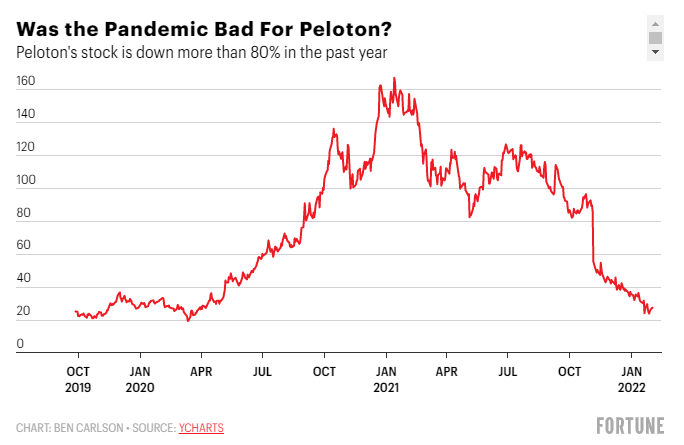I wrote the following piece before this CNBC story about the Peloton CEO stepping down and laying off 2,800 employees. It was also written before this WSJ story came out about the potential for Amazon to buy the exercise company.
I actually think it makes a lot of sense for Bezos to buy Peloton. If they roll my Peloton subscription into my Prime subscription that would be fine with me.
But Peloton likely wouldn’t even be involved in these rumors of a buyout if it wasn’t for the pandemic. I think the pandemic was actually a bad thing for the company’s stock (and a handful of other stocks you would have assumed would be benefitting from Covid).
This piece I wrote for Fortune explains why.
*******
In December 2019, Peloton was an $8 billion market cap company with sales of $1.2 billion and 2 million users.
For an exercise company that was founded in 2012, getting to this size in such a short amount of time was quite an accomplishment. Then the pandemic hit, gyms were shut down and millions of workers were introduced to remote work. The company’s growth went into hyperdrive.
By January 2021, Peloton’s subscribers jumped to 4.4 million, sales grew to $3 billion and the stock was trading at a valuation of almost $50 billion.
They went from a scrappy upstart to one of the most widely known exercise brands in the country. Now the company has more than $4 billion in sales and 5.9 million users. So the stock must be doing well, right? Not quite. It’s down more than 80% over the past year:

So even though Peloton has more than four times the sales and three times the number of users, the market cap is right back to where it was at the end of 2019 at around $8 billion. The stock price is actually lower now than it was in December 2019 before any of the pandemic-related growth took place.
How is this possible?
You could make the case the pandemic was actually the worst thing that could have happened to this company. While the company experienced massive growth in a short period of time, expectations and the stock price grew at an even faster pace. The company couldn’t possibly live up to the monster growth in its share price. Peloton’s CEO recently stated the company would have to cut back on the production of their exercise bikes and potentially lay off staff members.
Peloton is not alone in experiencing a counterintuitive move in their share price during this weird economic environment.
Netflix had 130 million global subscribers by the summer of 2018. The share price on the stock was around $420/share by July of that year. The company was turning in an annual profit of roughly $900 million at the time. With little to do at the outset of the pandemic but watch TV, the number of Netflix subscribers exploded higher, reaching more than 222 million households in 2022. Net income for the company is now $5 billion. Yet the stock price at around $440/share isn’t much higher than it was back in 2018. It’s down more than 30% from all-time highs reached last year.
Just like Peloton, the growth numbers for Netflix were simply too good during the pandemic. That set the bar too high for future growth. In fact, the company admitted as much on their recent quarterly earnings call. Here’s what CFO Spencer Neumann stated in a call with analysts:
So overall, the business was healthy. Retention was strong. Churn was down. Viewing was up. But on the margin, we just — we didn’t grow acquisition quite as fast as we would have liked to see, and on our large subscriber base, a small change in acquisition can have a pretty big flow-through in paid net adds. And again, our acquisition was growing, just not growing quite as fast as we were perhaps hoping or forecasting.
The fundamentals of the company have improved over the past four years or so but investor expectations were even higher than the stock price. Thus, the company’s shares have underperformed.
There are other companies that were early beneficiaries of the pandemic that are now experiencing similar growing pains. Zoom (-73%), Teladoc (-73%) and Robinhood (-79%) all saw strong growth because of the way our lives were impacted by the pandemic. Yet their share prices have all gotten crushed even as their fundamentals improved.
One of the hardest parts of investing in stocks comes from the fact that expectations drive almost everything in the short-term. Legendary investor Howard Marks explains it like this:
First-level thinking says, “It’s a good company; let’s buy the stock.” Second-level thinking says, “It’s a good company, but everyone thinks it’s a great company, and it’s not. So the stock’s overrated and overpriced; let’s sell.”
Of course, Peloton, Netlfix, Zoom, Teladoc, Robinhood or any other growth stock that’s getting killed right now could get its mojo back. The pendulum always swings back and forth between optimism and pessimism, excitement and despair.
In the short-run, every stock is some combination of fundamentals, trends, perception and stories investors tell themselves. That’s all valuations are in many ways—stories. Stories about growth, potential and what the future could look like for the company.
Unfortunately, the stories investors were telling themselves about some of the pandemic’s hottest stocks went a little too far when reality didn’t live up to the expectations.
This piece was originally published at Fortune.
